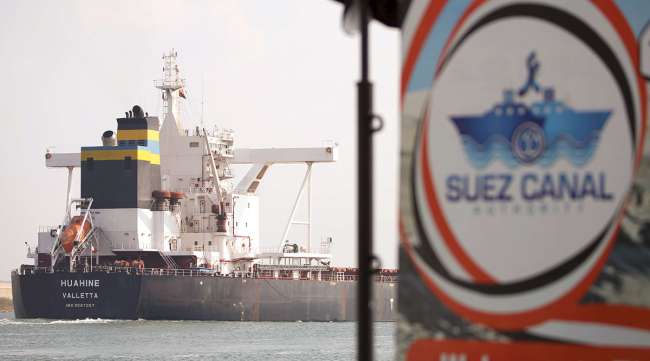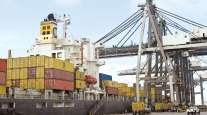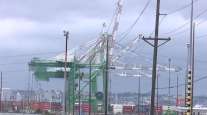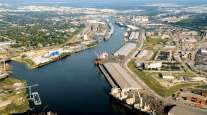Staff Reporter
US Trucking Faces Downstream Effects From Suez Canal Attacks

[Stay on top of transportation news: Get TTNews in your inbox.]
A militant group that is attacking container vessels along the Suez Canal in Egypt is causing shipment disruptions that threaten to inflict downstream effects on the U.S. trucking sector.
The Houthi movement in Yemen began targeting vessels transiting the Red Sea late last year as part of a larger response to the Israel-Hamas War. The Suez Canal is an important waterway for global container shipping in the region, as it connects the Mediterranean Sea to the Red Sea.
“They’re aiming attacks through missile or drones at container vessels in the Bab-el-Mandeb strait, and that strait is an essential throughput all the way to the Suez Canal,” said Eric Fullerton, senior director of product marketing at Project44. “But 16% of all trade and 30% of container trade goes through Suez, so it’s a super-important choke point for the supply chain.”
Project44 found in a Jan. 5 report that vessel volumes in the canal have fallen to an average of five vessels per day, well below the typical double-digit ships per day volume. The report noted that 211 vessels have been rerouted, while an additional 10 vessels are drifting. It also found vessels trying to get through are being delayed between seven and 20 days.
“The least wide point going into the Red Sea from the Gulf of Aden happens to be Bab-el-Mandeb,” said Pawan Joshi, executive vice president of products and strategy at the network supply chain platform E2open. “Which is notorious, not just in terms of the pirates, but also in terms of these attack boats.”
The Houthi attacks have become severe enough that an international military response was launched in late December called Operation Prosperity Guardian. But Fullerton noted that confidence in the U.S.-led effort was wavering as attacks continued into this year. That includes shipping companies that are suspending operations in the region by either waiting to send shipments or simply rerouting around the area.

Fullerton
“There’s this multitude of impacts,” Fullerton said. “One is what’s in the area and what are we going to do with those vessels and those goods. Are we going to try to ship them through with Prosperity Guardian? Are we going to try to reroute them around the Cape of Good Hope in Africa? Obviously, there’s a lot of impacts as a result of that.”
Hapag-Lloyd on Dec. 18 became one of several container shipping companies to suspend operations in the Suez Canal and the Red Sea. The company started rerouting vessels around the Cape of Good Hope, stressing that the situation had become too unsafe for crews.
“I would not expect major disruptions of the supply chains for the next weeks to come,” a spokesperson for Hapag-Lloyd said. “But, of course, it depends on the duration of this situation. We should not compare this with the COVID situation, when ports were congested mainly not because of high demand but because of lack of manpower due to quarantine issues and sick staff.”
Hapag-Lloyd ranks No. 13 on the Transport Topics Top 50 list of the largest global freight companies.
Project44 is evaluating the possibility that these delays could cause congestion at U.S. ports when the ships eventually arrive but hasn’t yet detected a noticeable increase for ports along the new routes. But Fullerton still suspects there will be downstream effects on domestic transportation, including port congestion.
“Obviously manufacturing is going to be impacted,” Fullerton said. “It is likely that we’ll see stock-outs. They probably won’t appear until February as an estimate. And then they may have even broader manufacturing impacts.”
Compounding the issue, Joshi pointed out that during the past nine months, some shipping traffic has been diverted to the Suez Canal because of drought conditions along the Panama Canal. With this shift, potential delays from both canals bring the threat of choking global ocean shipping and, down the supply chain, truck freight.

Joshi
“If that ship or that set of ships start getting delayed by 20 or 30 days — given additional transit time, wait times, or things like that — all of a sudden, anything that I was anticipating will arrive today and the next, let’s say 20 days, is going to get delayed,” Joshi said. “When that gets delayed, I have fewer trucks that may get filled up.”
Joshi added shippers have fixed scheduling windows, so disruptions and delays can impact other operations.
Mike DeAngelis, head of ocean operations at FourKites, expects some containerized ocean shipments originating in Asia that would normally travel via canal to the East Coast will instead terminate at West Coast ports and be routed cross-country to the East Coast by rail or truck. He noted cargo owners pursuing this option to avoid canal-related delays should expect a price increase for the overland routing.
“Given the current geopolitical instability and the resulting reduction in vessels transiting the Suez Canal, we would normally anticipate an increase in Asia-U.S. East Coast ocean container shipments being routed via the Panama Canal instead,” DeAngelis said. “This will prove to be less of an available option than usual. And there is a good deal of uncertainty as to how long the disruptions at each of these canals will continue.”
Want more news? Listen to today's daily briefing below or go here for more info:




